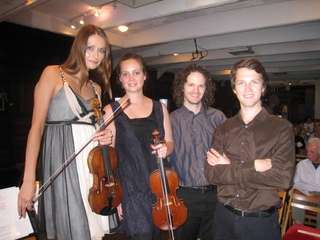|
Back
Two-Thirds of a Trio for Quartet New York
BargeMusic, Fulton Ferry Landing, Brooklyn
07/24/2010 -
Terry Riley: G-Song – Cadenza on the Night Plain
Nico Muhly: Stride
Philip Glass: String Quartet No. 2: Company
David Lang: Wed
Voxare String Quartet: Emily Ondracek, Galina Zhdanova (Violins), Erik Peterson (Viola), Adrian Dauroy (Cello) 
The Voxare Quartet (© Herring Rollmop)
The second night of Voxare’s three-concert “Terry Riley Weekend” at BargeMusic minimized Mr. Riley’s works to a pair, but the second work was quite spectacular.
The opening G-Song was a repeat from the opening night. I had enjoyed it then for keeping me on edge with those jagged rhythms. The second time around, I felt something which had not occurred to me before. Namely, the intricate, almost mathematical counterpoint employed by Mr. Riley. Instead of the G Major scales I had been enchanted with, now the opening seemed more like a Brandenburg concerto, the Bach-like rhythms, echoed, repeated and complemented by the strings of the Voxare. It lent another dimension to what was already a delightful piece on many levels.
While totally enjoyable, (as is all of Riley), nothing was easy about the last half of the program, a 30-odd minute major work written originally for the Kronos Quartet, Cadenza on the Night Plain. Actually four cadenzas, since each of the four players had long cadenzas of their own, solo pieces of great difficulty. I don’t know if they were improvised or not (Terry Riley himself was once classified as “an improviser who also composes”), but the Voxare players sailed through it easily, almost breezily.
The problem–and the asset–of Riley’s longer works is that they are both episodic and modular. I had not heard Cadenza before, but would have liked to know, at least on the program, if the movements had names or dynamics or things to say. Terry Riley has a most poetic sense of titles. Just think of Friday’s Sunrise of the Planetary Dream Collector, which could have been an inspiration for the newest Leonardo DiCaprio film, Inception. The movements and fragments and episodes took us through some wild experiments in AmerIndian and East Indian music, through jazz, through Slavic exoticism, and through the most beautiful tapestries of sliding and meeting and lines crisscrossing each other.
So against my better judgment, perhaps it was best not to know what it was all about. It was splendid music by a man who hides his expertise under a patina of sheer inspiration.
Two shorter pieces had their charms. Nico Muhly’s Stride had the usual Philip Glass-inspired bouncing lines and repetitions. It was unchallenging listening, but not unlikeable. David Lang’s Wed had been played before at Bargemusic, by the Flux Quartet. It was a short work to celebrate the state of wedded bliss. Here, Emily Ondracek did the honors with a soaring violin above the ensemble.
Finally we come to Philip Glass’s Second String Quartet. I had heard it whisked through by the Kronos Quartet, and taken at a slow and warm string orchestra rendition. The Voxare Quartet took it in a middle way. The lovely beginning turns into a swirling sweet sorrow, and an almost cold finale.
But that is how it should be. For the quartet is based upon those desolate lines of Samuel Beckett, which need quoting (and needed quoting in the program itself):
“To one on his back in the dark a voice tells of a past. With occasional allusion to a present and more rarely to a future as for example, You will end as you now are. And in another dark or in the same another devising it all for company. Quick leave him.”
Harry Rolnick
|